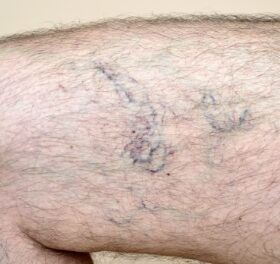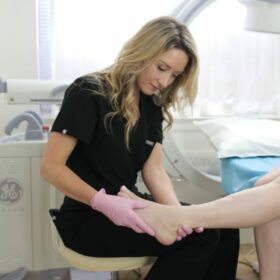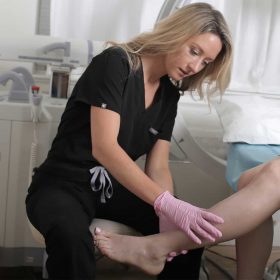How to treat early varicose veins?
Do you have bulging, twisted veins? If so, you may have varicose veins. These veins are common and usually aren’t a serious health problem. But they can be painful and unsightly. They can also be symptomatic of chronic venous insufficiency, a dangerous medical condition caused by the collapse of vein valves. Early varicose veins may not seem like a major medical problem, but you must seek treatment to avoid the complications of untreated vein disease, such as leg ulcers and deep vein thrombosis.
Vein Treatment Clinic is a group of state-of-the-art spider vein and varicose vein treatment clinics specializing in cutting-edge minimally invasive procedures. Our vein doctors take a considered approach to vascular health and curate a personalized treatment plan to address the root cause of your varicose veins — not just the symptoms. You can find our best vein centers in California, New York, Long Island, New Jersey, or Washington, D.C. In California, we have offices in San Diego (in the La Jolla neighborhood) and San Jose.
Below, we describe the best home remedies and minimally invasive treatments for varicose veins. Please schedule an appointment at the best clinic for varicose veins today.
Home Remedies to Alleviate Symptoms
Most varicose veins treatments are aimed at relieving symptoms. But if your varicose veins are very large or painful or if you have the signs and symptoms of underlying chronic venous insufficiency, your doctor may close or remove the veins. You can take numerous steps to relieve the symptoms of varicose veins and prevent them from getting worse. The following are the best solutions to alleviate the symptoms of early varicose veins:
- Wear loose clothing. Avoid clothes that are tight around your waist, legs, or groin.
- Elevate your legs when you’re sitting or lying down. Do this for 30 minutes three times a day.
- Exercise regularly. Walking is especially helpful.
- Wear supportive hosiery. Compression stockings or pantyhose that apply gentle pressure to your legs can reduce swelling and push the accumulated blood toward the heart. Talk to your vein doctor about which type of compression stockings is right for you. You may need to try different types to find the most comfortable ones.
Minimally Invasive Treatments for Varicose Veins
The aforementioned home remedies can certainly alleviate the worst symptoms of varicose veins and vein disease. But they can’t treat underlying vein disease or remove the existing varicose veins. The following are the best minimally invasive treatments for varicose veins.
- Sclerotherapy. This involves injecting a solution into the veins. The solution damages the vein walls, and the veins eventually fade away.
- Foam sclerotherapy. This is a newer type of sclerotherapy. It uses foam instead of liquid to damage the vein walls.
- Endovenous ablation therapy. This minimizes varicose veins by heating the vein from the inside. A thin, flexible tube (catheter) is inserted into the vein. Radiofrequency waves or a laser passes through the catheter to heat the vein. This makes the vein collapse and fades away.
- Ambulatory phlebectomy. This minimally invasive surgical procedure involves the physical extraction of superficial varicose veins through small incisions on the skin’s surface.
Tips to Control & Manage Symptoms
In addition to undergoing minimally invasive treatments for varicose veins, you must take special measures at home to prevent varicose vein recurrence or stop their progression.
- Don’t stand or sit for long periods of time. If your job requires you to stand for long periods, take breaks often to walk around.
- Don’t sit with your legs crossed. This can put extra pressure on your veins.
- Lose weight if you’re overweight. Extra weight increases the pressure on your veins.
- Wear flat shoes or shoes with low heels. High heels can make varicose veins worse.
- If you have varicose veins and are pregnant, talk to your vein doctor about ways to prevent their progression or manage their symptoms.
Can I get homeopathy for varicose veins in my legs?
Homeopathic remedies are said to be safe and effective for treating many conditions, including varicose veins. However, no scientific evidence supports the claims that homeopathy is effective for treating varicose veins. That’s because varicose veins are caused by damaged vein valves, and homeopathic medicine can’t treat that problem. The only way to treat varicose veins is with minimally invasive varicose vein treatments.
What happens if varicose veins are left untreated?
If you have mild symptoms, you may not feel the need to seek treatment right away. However, varicose veins can worsen over time, causing additional symptoms such as pain, swelling, and skin ulcers. If left untreated, varicose veins can also lead to more serious health problems, such as blood clots and deep vein thrombosis. That’s why you must seek treatment for varicose veins at the earliest stage possible.
Does high blood pressure cause varicose veins? Or do varicose veins cause high blood pressure?
Varicose veins are caused by valves not working properly, which causes blood to pool in the veins. This can lead to an increase in blood pressure. High blood pressure can also damage the valves in the veins, which can lead to varicose veins. As such, high blood pressure and varicose veins can be interconnected, increasing the risk of the other.
How can I stop varicose veins from progressing?
- Keep your legs elevated when possible. This will help blood flow more easily through your veins and reduce the pressure on them.
- Exercise regularly. This will help to improve your circulation and keep your veins healthy.
- Wear compression stockings. These will help to reduce the swelling in your veins and make it easier for blood to flow through them.
- Eat a healthy diet. This will improve your circulation and keep your veins healthy.
The aforementioned lifestyle changes won’t treat varicose veins, but they may prevent them from worsening. The only way to treat varicose veins is with minimally invasive spider vein and varicose vein treatments, so you must contact a reliable board-certified vein doctor.











